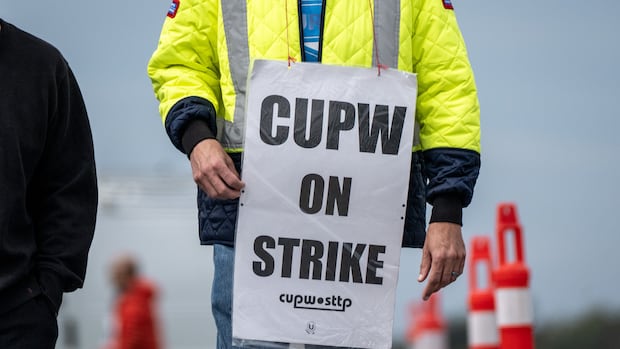PoliticsThe Canada Industrial Relations Board has dismissed an argument from the Canada Post workers union that a government back-to-work order was unconstitutional.Government ordered end to postal worker strike last DecemberBen Andrews · CBC News · Posted: Oct 23, 2025 8:32 AM EDT | Last Updated: October 23Listen to this articleEstimated 3 minutesCanada Post workers are pictured on strike at the Canada Post processing centre in Richmond, B.C., on Sept. 26, 2025. (Ben Nelms/CBC)The Canada Industrial Relations Board (CIRB) has dismissed an argument from the Canada Post workers union that a government back-to-work order was unconstitutional.On Dec. 13, 2024, federal Labour Minister Steve MacKinnon exercised his authority under Section 107 of the Canada Labour Code to direct the CIRB to end the postal workers strike and take over arbitration of the labour dispute.The Canadian Union of Postal Workers (CUPW) argued that using Section 107 to force an end to the strike was unconstitutional, and questioned whether striking workers’ Charter rights had been violated.In a hearing decision, the CIRB found the right to strike is “essential” but “not absolute.”The board ultimately concluded that use of Section 107 does not violate the Charter. The board also found it does not have the authority to review the minister’s direction to suspend the workers’ right to strike.One member of the three-member board dissented.Member Paul Moist wrote the dissenting opinion and sided with the union, calling the minister’s use of the labour code “reverse engineering of the highest order.”“Section 107 was used as a tool of political expediency to avoid the parliamentary process and public debate,” he wrote.In Moist’s view, the board should not have been allowed to issue the labour minister’s back-to-work order, as it restricted or suspended the workers’ right to strike, thereby violating their Charter right to a meaningful process of free collective bargaining.CUPW also filed for judicial review, but there has been no decision to date by the federal court.The CIRB said in an email it notified the parties involved on Aug. 13, the date the decision was issued. The decision was sent out publicly Thursday after a translation was available.Hotly contested legislationUnions have consistently decried the government’s use of Section 107 as a tool for intervening in labour disputes, saying it sets a dangerous precedent for workers’ right to strike.They argue the tool, which has been repeatedly used by the Liberal government to intervene in strikes, discourages employers in federally regulated industries from meaningfully engaging in bargaining and has undermined the government’s ability to end strikes.Section 107 has been a part of the code since 1984 and was rarely used, but in recent years the Liberal government has invoked it multiple times.Use of the code to intervene in a strike recently came to the fore when then-Labour minister Patty Hajdu ordered an end to the Air Canada flight attendants strike hours after it had started — an order the union ignored.In addition to the Air Canada dispute, the government has recently used the provision in labour action between workers and Canada’s two largest railway companies, ports in Montreal and Vancouver, and Canada Post.ABOUT THE AUTHORBen Andrews is a reporter with CBC News in Ottawa. He can be reached at benjamin.andrews@cbc.ca or @bendandrews.
Canada Post workers union loses challenge of back-to-work order











